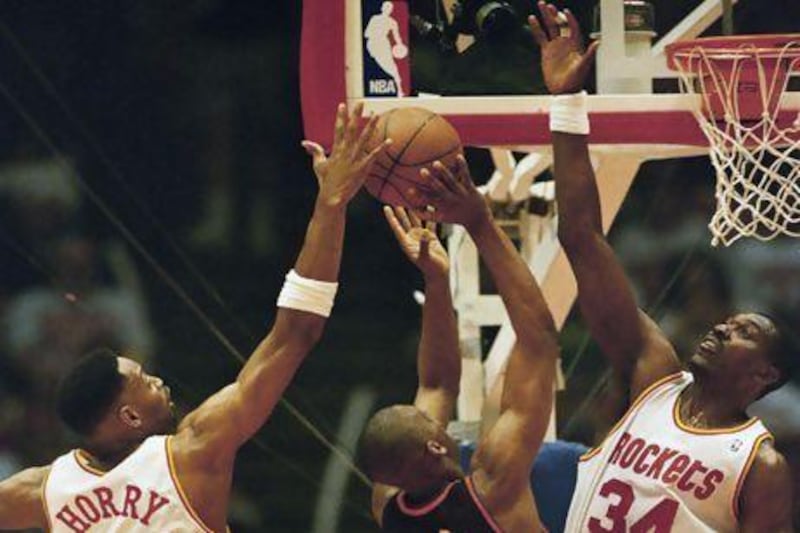Had Hakeem Olajuwon been playing basketball in today's media-saturated world of social networking and 24-hour rolling news, he would be one of the most recognisable athletes on the planet.
Instead, one of the greatest centres to play in the
[ NBA ]
was able to shun the limelight, dedicate himself to Islam and retire to a life of relative obscurity.
Olajuwon was the No 1 draft pick of 1984, selected ahead of Michael Jordan and Charles Barkley.
Over the course of the next 17 years he led the Houston Rockets to two championships and became the first player in NBA history to be elected MVP, championship finals MVP and Defensive Player of the Year in the same season.
Yet while these achievements are remarkable in themselves, it was Olajuwon's ability to play at a high level during Ramadan that caught the eye.
While fasting and having taken on no fluids for more than 12 hours ahead of game time, when tip-off arrived, his statistics would go up rather than down.
In February 1995, he was named NBA Player of the Month, despite Ramadan having started on February 1. In a 1997 report, the
New York Times
described a fasting Olajuwon as "depleted" and "dominant" in a match against Jordan's Chicago Bulls.
"I always felt bad for him," Robert Horry, a teammate of Olajuwon's from 1992 to 1996, said recently.
"I don't mean for that to come across wrong, but when you are playing an NBA game, you gotta have massive reserves of energy.
"There are 48 minutes to a game and for you to play 42 minutes of that 48 and not even be able to take a sip of water, that is just phenomenal."
Olajuwon now lives in Jordan with his wife and children, but Horry occasionally meets him in Houston whenever the Nigerian, now 50, returns to visit.
When that occurs, the former players - both of whom stand just under 7 feet - call each other "Softie".
Throughout an interview with
The National
, Horry referred to Olajuwon by his nickname "Dream".
"I rate Dream as one of the top five players ever to play the game of basketball. He could do anything; there is nothing on the court he couldn't do," he said.
"He gets a lot of credit from players, but because he was a quiet guy, and the access to him was so low, he never had the shoe commercials that would have pushed him out into the public. Now there is so much social media and stuff that even players who could never have played when we played are thought of as great."
Horry recalls a television commercial Olajuwon did for Taco Bell, a US fast-food chain specialising in Mexican food.
Appearing alongside Shaquille O'Neal, the two men are seen riding a tandem bike, with Olajuwon at the back. "We used to joke about that," Horry said.
"We'd say, 'Dude, you won the championship and you take the back seat to Shaq on the bike? You need to be on the front.' But that was the type of guy he was. He never wanted recognition. He just wanted to play ball."
A more significant example can be taken from 2008, when the Rockets unveiled an honorary monument to Olajuwon outside their arena in Houston.
Aware that their star's Islamic beliefs forbade a statue bearing a likeness or picture, a 12-foot-high bronze sculpture of his famous No 34 jersey was erected instead.
The following year, Olajuwon spoke about his religion and life in Jordan, saying he prefers to endure Ramadan in the United States, as it proves more of a challenge.
"If people are eating and drinking in front of you, the willpower of the Muslim should be stronger. That is what the training is for," he said. "It's like somebody who swims in a pool or somebody who is swimming in the ocean. The ocean is stronger so makes a better swimmer.
"I find in the Arab world that when they are fasting, they say they are weaker and they don't work as hard. But it should be the opposite."
When asked if he had shared this belief with his Muslim friends in Jordan, he laughed: "Yeah, but they think I'm crazy."
Horry added Olajuwon never forced his religion onto teammates and never expected them to hide away to consume fluids.
"Even on the bench we would be drinking, but we totally respected his religion," Horry said. "We would base our practices around it, with time factored in for him to go pray and we showed such respect to him because we knew he was such a vital part of the team. Whatever Dream wanted, we would do."
More than a decade after retiring, Olajuwon now has an online presence. His Twitter handle is @DR34M and he has a little more than 13,000 followers.
Follow us
[ @SprtNationalUAE ]





